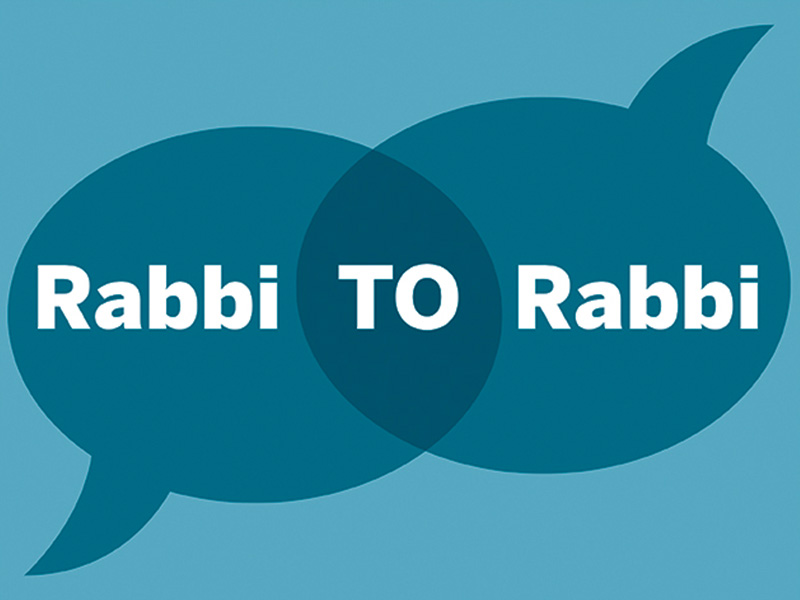If you were stranded on a desert island and could only take 10 Jewish texts with you, which ones would you choose?
Rabbi Yael Splansky
Holy Blossom Temple, Toronto
Rabbi Mark Fishman
Congregation Beth Tikvah, Montreal
Rabbi Fishman: There is a popular British radio program called Desert Island Discs, which asks famous politicians and well-known members of society to discuss their favourite songs. I would like to introduce a spinoff: Desert Island Texts.
Rabbi Splansky, If you were stranded on a desert island and could only take 10 texts with you, which would you choose, and why?
Rabbi Splansky: I’ve heard it said that rabbis really only have one sermon in them. We each have one core text and “riff” on it over and over again. I don’t believe it. But maybe 10 core texts each.
If I were forced to choose, I might include Hillel’s great balancing act: “If I am not for myself, who will be for me? If I am only for myself, what am I? And if not now, when?” (Pirkei Avot 1:14) Every lifetime is spent in search of fulfillment. Everyone wants to be good. Hillel’s simple questions help to clarify the choices we make day by day.
If I were stranded alone on a desert island, I’d be better off asking these questions and doing my best to answer them.
Rabbi Fishman: I would like to introduce the possibility of taking an entire genre – that of the midrash – with me to the island. We have just come off the reading of Parshat Mishpatim, and in a fabulously important comment (21:2), Rabbi Shimshon Raphael Hirsch writes that the written Torah without the commentary of the oral Torah is practically a closed book. Each needs the other in order to fully understand what the text means.
I personally take this approach with midrashim on the narrative sections of the Torah, too. The legends, interpretations and the sometimes fanciful other aspects beneath the surface are Torah as well. When I teach my classes, I heavily rely on the interplay between both worlds – the text and the interpretation – to better understand Torah.
Rabbi Splansky: I never heard the radio program, so I don’t know the rules of the game. Are you cheating when you take an entire genre of Jewish literature with you, rabbi?
I also delight in the rabbinic imagination and find midrashim are our finest teaching tools. Perhaps we should pack the phrase that says Torah “is not in Heaven nor is it beyond the sea… It is very close to you, in your mouth and in your heart, that you may do it” (Deuteronomy 30:12-14).
This would be encouraging on a desert island. Creativity, interpretation and even improvisation have allowed Jewish life to flourish (or at least endure) in every time and place. Remember when Israeli astronaut Ilan Ramon inquired about the proper time to make Kiddush in outer space?
On an uninhabited island we might ask “How do we study Torah?” The answer might be by pivoting the text at every angle until all 70 facets are gleaming in the sun.
Rabbi Fishman: If I had to choose one narrative, it would be the story of Adam and Eve in the Garden of Eden. I never tire of teaching the story, and each time, I find greater levels of depth contained between the lines.
For me, this is a story of birth, maturation, temptation and failure. Yet, the story concludes with the optimistic stance that expulsion from the garden is our challenge to find our way back. With this backdrop, the Garden of Eden is not so much something humanity is given on a silver platter, but rather something that we earn through our own efforts, and ultimately something we can make for ourselves here on Earth.
Rabbi Splansky: The Garden of Eden narrative is hopeful, but it isn’t joyful. One thing I know I’d need on a desert island is a joyful text to lift my spirits.
I may even pack up the chassidic rule of thumb: when in doubt, hum a niggun and think it through again. When fearful, hum a niggun – one beat for every step forward. When uplifted, raise your voice until, like Jacob, you “pick up your feet” (Genesis 29:1).
This was a fun start. I look forward to welcoming you to Toronto for our first Rabbi2Rabbi Live event. All are welcome to join us and CJN editor Yoni Goldstein for discussion and debate of Desert Island Texts on March 10.
